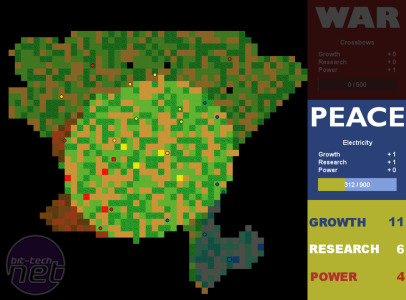
For a long time there’s been talk among the more ambitious and feather-brained developers and players of games about a hypothetical artistic pinnacle of gaming – "the Citizen Kane of videogames". From the title of War and Peace you might expect this game attempts to reach that aim, perhaps by attempting to adapt the infamous Russian novel into game form.
But you’d be wrong, because War and Peace doesn’t have anything in common with Tolstoy’s colossal opus. Instead, it’s a de-make of perhaps the most-loved PC game of all time and the one title which could definitely hope to rival Tolstoy’s novel in depth. Well, if you’re feeling a bit hyperbolic anyway.
War and Peace is best explained as Civilization with only one button – a toggle which flips you between conflict and compromise.
[break]
Everything else in War and Peace is automatic and the crude graphics represent the various civilisations as blocky pixels that run around the screen creating cities and expanding all on their own. The only interaction you get with them is to decide if they are at peace with the societies around them, or at war.
Just because War and Peace has reduced your interaction to a single button though doesn’t mean it’s a simple game. There are still research paths and multiple ways to win the game depending on your actions and the state of your country still affects how it grows. When you’re at peace you can research new technology, for example – but war means you can expand into new territories faster and destroy the opposition.
Timing is everything, naturally. If you plunge straight into war at the start of the game then you might be able to gain a slight advantage over the other cavemen, but if they elect to stay peaceful then they’ll have developed rifles while you’re still using stone axes. On the other hand, if you stay peaceful and hope to develop a space programme before anyone else then you risk being conquered by those who’ve pushed their research towards military means.
War and Peace obviously doesn’t rival Civ in complexity or longevity, but it’s still nowhere near as straightforward as you might imagine. In fact, regardless of any obvious commentary embedded in the game, it’s worth playing just to see how much games can do with just one button.
But you’d be wrong, because War and Peace doesn’t have anything in common with Tolstoy’s colossal opus. Instead, it’s a de-make of perhaps the most-loved PC game of all time and the one title which could definitely hope to rival Tolstoy’s novel in depth. Well, if you’re feeling a bit hyperbolic anyway.
War and Peace is best explained as Civilization with only one button – a toggle which flips you between conflict and compromise.
[break]
Everything else in War and Peace is automatic and the crude graphics represent the various civilisations as blocky pixels that run around the screen creating cities and expanding all on their own. The only interaction you get with them is to decide if they are at peace with the societies around them, or at war.
Just because War and Peace has reduced your interaction to a single button though doesn’t mean it’s a simple game. There are still research paths and multiple ways to win the game depending on your actions and the state of your country still affects how it grows. When you’re at peace you can research new technology, for example – but war means you can expand into new territories faster and destroy the opposition.
Timing is everything, naturally. If you plunge straight into war at the start of the game then you might be able to gain a slight advantage over the other cavemen, but if they elect to stay peaceful then they’ll have developed rifles while you’re still using stone axes. On the other hand, if you stay peaceful and hope to develop a space programme before anyone else then you risk being conquered by those who’ve pushed their research towards military means.
War and Peace obviously doesn’t rival Civ in complexity or longevity, but it’s still nowhere near as straightforward as you might imagine. In fact, regardless of any obvious commentary embedded in the game, it’s worth playing just to see how much games can do with just one button.

MSI MPG Velox 100R Chassis Review
October 14 2021 | 15:04







Want to comment? Please log in.